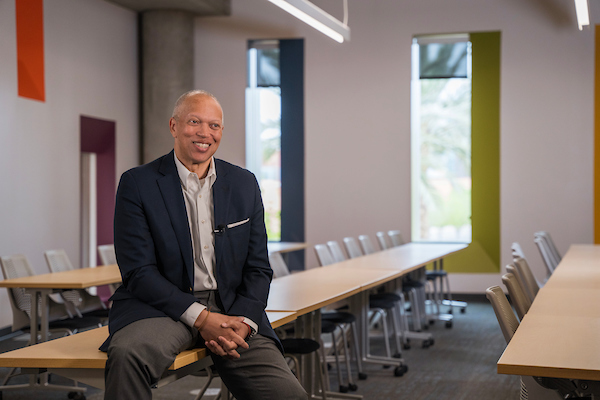
>> Executive Connections Stories
Be willing to embrace change: An interview with mentor Lawrence Taylor

Lawrence Taylor
As the son of two teachers, Lawrence Taylor knows the value of a good mentor. When a couple of friends suggested he take part in the Executive Connections mentorship program at the W. P. Carey School of Business, he knew he wanted to be able to give back to current students.
“For MBA candidates, this is a real opportunity for them to speak to somebody who has been working for 20, 30, 40 plus years, in some cases,” he says. “You're able to impart real-world experience in terms of how you handle certain situations in the work environment.”
W. P. Carey spoke in-depth with Taylor about his experience working with ASU Full-time MBA students, how the program has made an impact on his life, and his favorite advice for students entering the business world.
Q&A with Lawrence Taylor
What is it that makes Executive Connections so unique and impactful? Mentors, alumni, and current students know best. This conversation has been edited and condensed.
Question: What makes the Executive Connections program so impactful for students?
Answer: It's the interaction between the mentors and the mentees that makes this a really unique experience for folks. It's interesting to bring together experienced executives who have seen a lot, professionally and personally, in the business world and have us impart some of those conversations and observations that we've experienced over the course of our lives to the MBA candidates. It's one of the few programs that I'm aware of in the country that actually partners MBA candidates with experienced business professionals in the community.
Q: How does Executive Connections differentiate the W. P. Carey Full-time MBA program from other MBA programs?
A: It's the program itself. It's the ability to partner experienced executives with semi-experienced folks who have worked a bit, but they're still in a nascent part of their career. It's a unique opportunity for these MBA students to be able to pick our brains on what we've experienced in the business world and how we've handled certain situations. I think it's a unique opportunity, and smart of the folks here at W. P. Carey, to bring the two groups together in a way that is beneficial not only to the mentees, but also to the mentors.
Q: What’s the best piece of advice you like to give your mentees?
A: I think the best piece of advice I've given them is to be an active listener. Everybody likes to talk. Everybody likes to present themselves in a manner that is eloquent and expressive and important and smart. But I think you gain far more by listening and by being an active listener. We all hear, but we don't all necessarily listen. I try to impart to my mentees that whenever you find yourself in a situation, it's much easier to take a step back and listen and take in multiple perspectives before you contribute to the conversation.
Q: What inspires you to take part in the Executive Connections program and be a part of the W. P. Carey community?
A: I’ll answer that in two parts. First is my parents. I come from a family of teachers, not only my parents, but other relatives who were teachers at the elementary, secondary, and college levels. So I enjoy this process of mentoring. Secondly, I'm not a native Arizonan. I've been here about 16 years, and this is really my first opportunity to get actively involved with the ASU community. It was through Bill Pesch and Terri Tierney Clark that I was introduced to this program. Dr. Amy Hillman is another person who reached out to me who I have great respect and admiration for. It was an opportunity for me to get more involved in the community and help impart some knowledge and wisdom on a small level.
Q: What does leadership mean to you?
A: I'll answer that in a quote from a dear friend of mine who is a retired lifelong Marine Corps officer. He told me one day, “I've led men and women into some really dark and scary places, and not a single time did they ever follow me because I said so.” To me, that's the essence of leadership. When people will follow you because they know you care about them, they know you have their back, and they know you're going to always look out for them.
Q: Have you had mentors during your career?
A: I've had numerous mentors over the course of my career. I still do. Some I actively sought out, and some sought me out. But I've had mentors since my first job. I think it's incredibly important for all of us, no matter what stage we are in our professional careers, to always be able to have somebody we can turn to who's more experienced, who has seen more than we have, and who we can ask questions and lean on for advice.